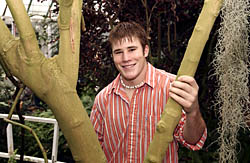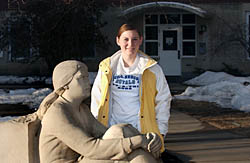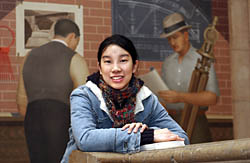Inside Iowa State | ||
Inside ArchivesSubmit newsSend news for Inside to inside@iastate.edu, or call (515) 294-7065. See publication dates, deadlines. About InsideInside Iowa State, a newspaper for faculty and staff, is published by the Office of University Relations. |
January 28, 2005 Bonuses abound in learning communitiesby Samantha Beres Learning communities have been touted as one of Iowa State's star programs. It's no wonder. Students in learning communities have higher first-term GPAs than their peers who aren't in the program. And they are more likely to remain in college, not just after the first year, but after the second and third years as well. When learning communities started at Iowa State in 1995, there were 12. Now, due in large part to their success, there are about 50. While every learning community is different, the students typically share common academic goals. Students in the communities often take two to three courses together during their first semester and study together. Some even live together. Most learning communities start newcomers off with a class to help them set goals and a coordinator to lead the way. And there are many bonuses as well, as Inside found out through recent conversations with students.
Matt Klingenberg, freshman Learning community: horticulture (non-residential) Major: horticulture Hometown: Marcus Why did you join the LC?You're guaranteed to get into classes, which is a big deal. I don't have to fill out 10 different schedules to guarantee my classes, and I feel like I worry a lot less. Other than the guaranteed classes, what else does your LC offer?There are a lot of things that I probably wouldn't have done on my own without the learning community. We went out to the horticulture farm and picked apples last semester that we donated to a food pantry in Des Moines. I met with one of my professors to practice going to a real business dinner. Being in a non-residential LC, how do you interact with peers in your LC?It's kind of like working. We see each other all day and then go home at the end of the day. We have classes together every day and we all help each other out. After some of our classes, we just stick around and do our homework together right then and there. Is there one thing that jumps out at you that has made your LC successful?If anyone else has an instructor like ours, then they're probably having a great success with their LC, too. Our instructor/coordinator, Barb Osborn, is really helpful. She knew which classes we needed and reserved them for us. I can find her 90 percent of the time if I have any problems with classes. What did Osborn have you do in your learning community class (110) that helped?We had to make a four-year plan and that started to help me immediately. You can see what classes you will have to take and it was very handy. We also did our resumes. That helped us motivate each other and get to know one another better.
Laura Meimann, freshman Learning community: Human development and family studies non-residential) Hometown: Colo Major: child development and family services, minor in gerontology What did you gain from being in a LC?I think it really helps academically. I have people I can study with, people with the same study habits who are focused and want to get good grades in class. How did the LC help you personally?It really helps when you're starting out. You don't know anybody on campus or in your major. You form friendships with different people. I've stuck pretty close with a bunch of the girls in same major and we get together outside of class. One of them, I plan to live with next year. What were the highlights of your LC last semester?Pat and Corly* made a really big effort to make us feel at home. For Halloween, we met at Corly's to carve pumpkins. For Christmas, we went to Pat's to decorate cookies. (*Adjunct instructor Pat Walsh is coordinator for the HDFS Learning Community, Corly Brooke is co-coordinator for the HDFS Learning Community as well as co-chair of the Learning Community Advisory Committee.) How will the LC program help you this semester?They reserved spots in classes for us this current spring term. For example, I am in HDFS 218 (study tour and service learning) and HDFS 269 (research in human development and family studies) because they reserved the spots for me. It sort of set up this semester, so we have the option to still get together to meet up and stay connected.
Pylin Sarobol, freshman Learning community: Women in Science and Engineering (WISE), (residential) Major: materials engineering Hometown: Bangkok, Thailand Did you know what to expect from your learning community?No, I didn't know what it would be like, but I'm really glad I did it. It helps with the transition from high school to university. It makes it easier to find friends. For my team, we live on the same floor so that makes it a lot easier. We walk to class together. Most of the time, we study together or help each other. How does your LC help you the most?For the WISE Learning Community, they hire grad students to tutor the main courses once a week, like physics, chemistry, math, and that really helped me a lot. Who besides the tutors helps out?The peer mentor was really good. She helped me plan the next semester of classes. She also does one-on-one meetings to ask if she can help with anything. I asked her for a list of professors who might need undergrad research assistants and she gave me a list. Basically, if you have any questions, she answers them. Are there other perks?We always have privileges. The night before the career fair, we'll have dinner with recruiters from the big companies. So, we'll have a chance to talk with them and interact with them. If they're interested in you, they might look at your resume. Is it all work and no play?We do fun things together, too. We go bowling, to the haunted house during Halloween; we're planning to go ice skating. There's always stuff that we do together, not just academically, but also socially.
Chris Smith, sophomore Learning community: entrepreneurship (residential) Hometown: Eau Claire, Wis. Major: (double) philosophy/business Your LC is a little different from the others. Can you explain?There is not as much of a need for the academic tutoring like other LCs because we don't all share the same classes. We also set our own standards. It's our first year so we're developing the program as we go. What ties you together then?You can be at any stage of starting a business. Some people want to learn how to start their own business, some want to try with a safety net, some want to just go out and do it. What is your start-up?My company started because I wanted to get my music out there with all of its glory. I have released a CD and am now designing a specialized show centered around my music. It will be a hybrid of theater and concert aspects, with large production qualities, but able to fit into small venues for that more underground and intimate feel. How will your LC help you achieve the goal?We have different people come in to tell us things we need to know to start a business. We had a banker come in and tell us about loans. The students within the LC have their own little specialties that you can draw on. Any other perks?Our mentors have connections all over the place, so if you need something, you have the connections. That's what a lot of business is, knowing people. We also have access to a seed fund of $25,000. If you take a loan from that, it's a no-interest loan.
Peer mentors part of learning communitiesPeer mentors are students who, in most cases, have been members of the learning communities they are mentoring. "This is an upper class student who is familiar with the curriculum and the ISU environment," said residence life coordinator Kurt Earnest. "Entering students may not be as familiar with Iowa State and the opportunities available here and mentors help them transition to their new community." There are approximately 140 mentors and most work about 10 to 12 hours per week in a paid staff position. Since each learning community is different, the duties for peer mentors can vary. Mentors may coordinate social activities, conduct team building programs and organize field trips. Some facilitate study sessions and many are involved in planning faculty-student dinners. Some mentors actually teach the learning community classes. "The advantage to the mentor is that they learn about students and this role provides a leadership opportunity for them," Earnest said. "Many mention how it has grounded them within their college, helped them form beneficial relationships with faculty members. And it's a great experience to talk about when they're interviewing." |
SummaryStudents in learning communities not only have higher first-term GPAs, they are more likely to remain in college than student not in the program. Inside recently asked some students in learning communities how else they benefit. |
|
Ames, Iowa 50011, (515) 294-4111. Published by: University Relations, online@iastate.edu. Copyright © 1995-2005, Iowa State University of Science and Technology. All rights reserved. |
||



